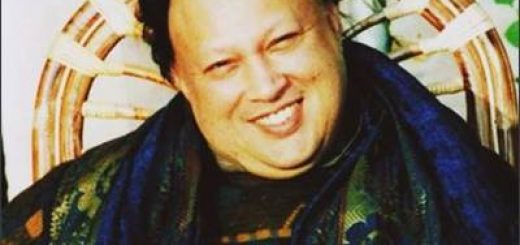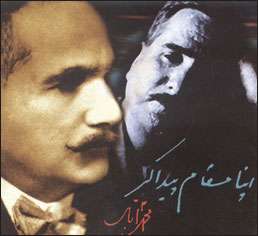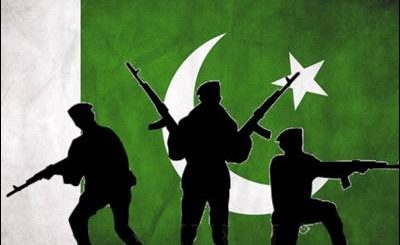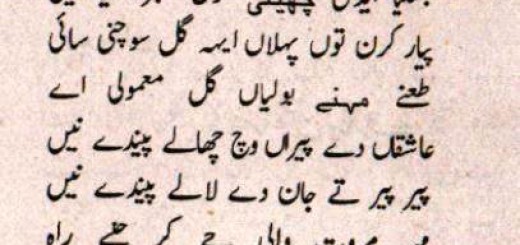Eight Songs I’d Take With Me to a Desert Island – By Asif Naqshbandi
The BBC Radio programme, “Desert Island Discs” recently celebrated its 70th anniversary and the occasion had me thinking about the eight songs I would choose if I were ever invited on to the iconic radio show.
The BBC Radio programme, “Desert Island Discs” recently celebrated its 70th anniversary and the occasion had me thinking about the eight songs I would choose if I were ever invited on to the iconic radio show. (Yes, dreams of fame effect us all!) For those of you not familiar with the format it is quite straightforward: a guest is allowed to choose 8 pieces of music which he or she would like to take with them if they were stranded on a desert island. In addition, the guest is permitted one luxury item and one book of their choice (in addition to the Bible and the Complete Works of Shakespeare). The guest is interviewed about their life and works in between nominating their choices of music and the reasons why. Guests have included almost everyone who is anyone in British public life over the past 7 decades. Imran Khan was a guest on the show, too, along with Vikram Seth and some other South Asians.
So, eschewing the interview about my life (you’ll have to wait for the autobiography for that!) I shall proceed to list here my eight pieces of music and the reasons why.
I shall also endeavour to make the music as eclectic as possible and reflective of my personal interests. The following is not in any particular order.
1. Recitation of Sura Rahman by Qari Syed Sadaqat Ali – this is my first choice and it is the most beautiful piece of Koranic recitation which I have ever heard. Reciting the Koran is an art in itself and those who are professionally trained to do so are given the epithet of “Qari” (literally, Reciter). The art itself is called Qara’at [recitation] and is also intimately linked to another Koranic science called tajweed which is the knowledge of correctly pronouncing the Arabic sounds of the Koran and where to pause and take a breath whilst reciting it. This breath control is very difficult and in this piece Sadaqat Ali displays wonderful mastery of this form of a capella singing. His voice is very sweet and clear and this piece always moves me to tears as I hear the words of My Lord sung so beautifully. It would be a great comfort to me on my desert island as I was alone.
2. “Aj Sik MitraN Di Vadheri Ay” (Today, the longing for the Beloved is strong indeed) by Muhammad Owais Raza Qadri. A Sufi poem in Punjabi written by Pir Sayyid Mihr Ali Shah of Golra, Islamabad, in praise of the Prophet, this, for me, is the greatest encomium ever penned and therefore finds its place on my list of eight. The poem is a spiritual masterpiece of the Punjabi language and provides one with the opportunity to think deeply about the Messenger and is also a poem of hope in the intercession of the Prophet in times of difficulty in the grave and on Judgement Day. This recitation by Owais Qadri is very emotional and he breaks down and cries during the live performance on a number of occasions. He has also got a very powerful and beautiful voice and coupled with the mystical lyrics and praise of the Prophet would be a great comfort for me as I was all alone on the island.
3. Haq Ali Ali Mawla Ali Ali by Ustad Nusrat Fateh Ali Khan.
The late Nusrat was my favourite singer and I could easily have chosen eight qawwalis just by him to take with me to my desert island. To pick only one from his masterful oeuvre was an almost impossible a task but I finally decided on this, perhaps his most famous work. It is also from the period before he was discovered by the West and began to experiment with his music by doing fusion projects with the likes of Peter Gabriel and Bally Sagoo, and is therefore based firmly in the classical raga tradition of Hindustani music. The topic is again mystical, this time focusing on the eulogising of Imam Ali, the fourth caliph of Islam, and son-in-law of the Prophet. The opening verses in classical Farsi and the rousing beat of this lengthy spiritual classic never fails to lift my soul and bring me closer to God. It also includes some of Nusrat’s most astonishing vocal singing of the musical scale (sa-re-ga-ma-pa-dha-ni-sa) which was to become a trademark of his. It is my favourite qawwali, narrowly beating both Aziz Mian’s Sharabi and the Sabri brothers Tajdar-e-Haram. Hence, it is one of the songs I would take with me to this island.
4. Chalte Chalte by Lata Mangeshkar. I grew up watching Bollywood films and this song from the film Pakeezah is, in my opinion, the greatest song in the history of Bollywood. It is a mesmerising combination of Lata’s nightingale-like voice, a catchy tune based on classical ragas from Hindustani music and poignant lyrics. It is the best example of the mujra [classical Khatak dancing originally performed by nautch girls] genre in all of Indian cinema and has never been surpassed (although the song Jab Pyar Kiya Tau Darna Kya, also by Lata, from the film Mughal-e-Azam almost got the vote!) This song always cheers me up and brings a smile to my face. Such is the sweetness of Lata-ji’s voice and the musical genius of Naushad that this song was the first one I wrote down on my list. It would keep me company in my solitude on the island as I never tire of it. Few songs are musically perfect but this one surely is. It is one of the best representatives of the eclectic Hindu-Muslim high culture which existed for a time in unified India and which the film Pakeezah represents.
5. Der Hölle Rache (the Queen of the Night aria) by Diane Damrau (from her album Ari die Bravura). When I first heard this aria from Mozart’s opera, Die Zauberflöte (The Magic Flute) sung by Diane Damrau, I was amazed that a human voice could achieve such feats. Her voice is that of a coloratura and she has effortless control of the scales and range required for this masterpiece by Mozart. My heart rises and falls in tune with her journey through the scales and high notes. It is like listening to a human song-bird. This song, almost single-handedly, made me a fan of opera and for that I shall include it on my list of eight. Of the many recordings available it is her studio recording of the aria for her album Ari die Bravura that I like best. This also showcases the genius of Mozart, my favourite Western classical composer and so is doubly deserving of a place on this list.
6. Ve Bol Sanval by Attaullah Khan Isakhelvi. I would need some reminder of Pakistan on the desert island and this folk song from the Punjab by Isakhelvi would be perfect as it would remind me of the sounds and smells of my village. In addition, it is a supreme example of the kind of folksy love song which Attaullah specialises in and my favourite song of his. Another factor is that it is sung in my mother tongue. Musically it shows off Attaullah’s voice at its best, with all the pathos and hurt and rough edges of the Punjabi countryside, and has a lovely rhythm and is playful in places. It always brings back so many memories. A must have for my island disc!
7. Sex Machine by James Brown. Whenever I feel like boogying or need to have some fun this song by ‘the godfather of soul’ always does the trick and brings a big smile to my face. It is probably one of the best examples of my favourite Western genre of soul music and would therefore merit a place on the list although it was difficult to choose between this or the same artist’s, ‘I Feel Good’ but the extra sexiness of this gave it the edge! Other songs just edged out were ‘Easy’ by Lionel Ritchie and Marvin Gaye’s Sexual Healing as well as BB King’s The Thrill is Gone and Ray Charle’s, ‘What’d I Say?’
8. “Jerusalem” by Sir Hubert Parry as performed by the BBC Symphony Orchestra.
I needed a song to remind me of England and I can think of not many better songs than this. Hearing it takes me back, every time, to my formative years, to the place which forever shall be ‘home’ – England. I can see the sun shining on the school playing fields on a summer’s day, the blue skies above, wisps of cloud, the thwack of willow on leather…happy memories indeed! This song is often called the unofficial national anthem of England (as opposed to the United Kingdom) and is based on the poem by William Blake, ‘And did those feet in ancient time’. This version is sung by the BBC Symphony Orchestra and singers and performed at the Last Night of the Proms which is a combination of things as British as one can imagine!
Well, there you have it. It was a really hard task and I had to leave out so many great pieces of music but I think I’m happy with my final choice. For my book I would first replace the Bible with Imam Ahmad Riza Khan’s Urdu translation of the Koran (with commentary in the margins by Mufti Ahmad Yaar Khan) and then select the complete works of Nabokov.
As a luxury item, I would choose a Macbook Pro laptop preloaded with my 100 favourite movies (and a solar powered battery charger!) I could then use the time to watch movies and also write when not listening to music!











